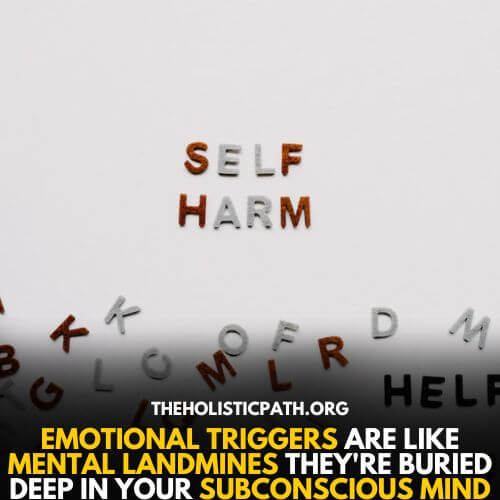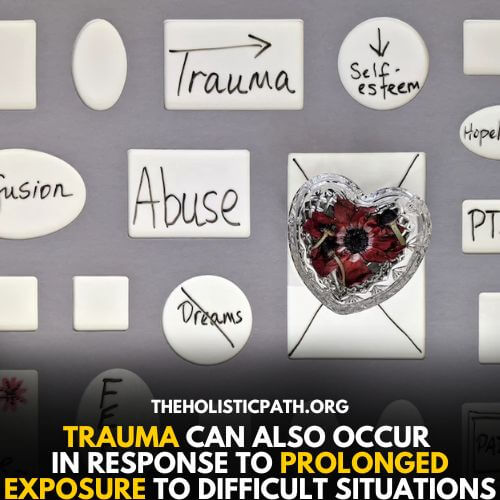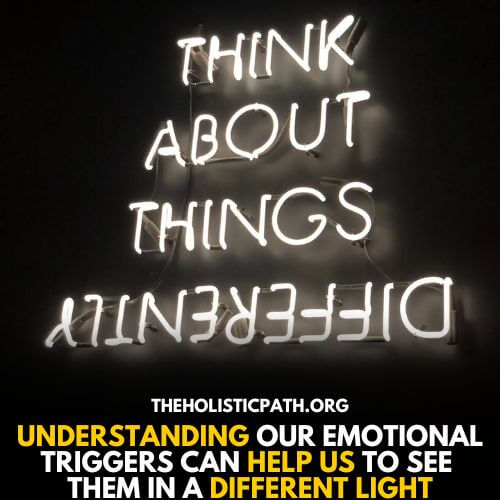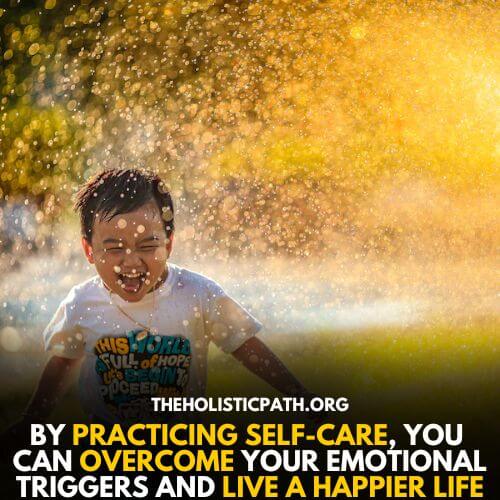We all know the feeling. That rush of anger, sadness, or fear takes over our bodies without warning. These sudden and intense emotions are called emotional triggers, and they can be incredibly powerful. They can cause us to act in ways that we later regret, or make decisions that we come to regret.
In some cases, emotional triggers can even lead to physical reactions such as a racing heart or nausea. So what are emotional triggers and what do they do? How can you identify your personal emotional triggers? And most importantly, what should you do if an emotional trigger is activated?
What Are Emotional Triggers And What Do They Do
An emotional trigger is anything—a thought, a memory, a person, a place, a sound, a smell—that sets off a negative emotion in you. It can be something that happened to you in the past or something that is happening in the present.
Emotional triggers are like mental landmines. They’re buried deep in your subconscious mind, and they can explode without warning, causing you to feel upset, stressed out, or even panicked.
An emotional trigger is a sudden and intense emotion that is caused by something external. Triggers can be positive or negative, but most often they are associated with negative emotions such as anger, sadness, or fear.
Triggers are often unexpected and can take us by surprise. They can cause us to act in ways that we later regret, or make decisions that we come to regret. In some cases, emotional triggers can even lead to physical reactions such as a racing heart or nausea.

Emotional triggers are powerful because they can hijack our emotions and override our logical thinking. When we are triggered, we can lose sight of what is happening around us and become consumed by the emotion.
This can be dangerous both physically and emotionally. It can lead to us doing things that we wouldn’t normally do, or saying things that we later regret. It can also cause us to feel overwhelmed and out of control.
When you have an emotional trigger, it’s like a button that gets pressed and the emotions come flooding out. You might feel angry, sad, scared, frustrated, or any other negative emotions.
These emotions can be overwhelming and can interfere with your ability to think clearly or function normally. In some cases, they can even lead to physical symptoms like a racing heart or shortness of breath.
If you have emotional triggers, it’s important to know how to deal with them in a healthy way. Ignoring them or trying to push them down will only make them stronger. Instead, try to identify your triggers and work on addressing the underlying issues. This can be difficult and might require professional help, but it’s worth it to get rid of those emotional landmines for good.
Types Of Emotional Triggers
There are many types of triggers, some more common than others. Some people might be triggered by a particular smell, while others might be triggered by a sound. It’s important to know what your triggers are so that you can avoid them or prepare yourself for them.
Internal Triggers
Internal emotional triggers are responses that we experience in response to events or memories. These triggers can be very powerful, and can often lead to behaviors or emotions that we regret later. Learning to understand and manage our internal triggers is an important step in self-care. Some common examples of internal triggers are:
- Memories
- Thoughts
- Plans for the future
- Goals
- Worries
- Guilt
- Shame
- Anger
- Fear
- Sadness
External Triggers
External emotional triggers can set off a series of events that can lead to an emotional outburst. Triggers can be anything from a stressful situation at work to a fight with a spouse. It’s important to be aware of your personal triggers and do what you can to avoid them or manage them when they come up. One of these common external triggers might also be affecting you:
- Receiving bad news.
- Seeing someone hurt or in pain.
- Hearing a loud noise.
- Smelling something unpleasant.
- Being in a crowded place.
- Watching a scary movie.
- Eating something that doesn’t agree with you.
- Experiencing physical pain.
- Having to confront someone you don’t like.
- Being away from your loved ones.
Anxiety Triggers
Anxiety is a type of emotional trigger that can be caused by a variety of different things. For some people, it may be triggered by stressful events or periods in their life. For others, it may be related to an underlying medical condition. Regardless of the cause, anxiety can be extremely debilitating and make it difficult to cope with day-to-day life.
There are a number of different symptoms that can be associated with anxiety, including a racing heart, sweating, shaking, shortness of breath, and dizziness. In some cases, anxiety can also lead to emotional numbing and feelings of detachment.
Some common anxiety triggers include:
- Public speaking
- Test taking
- Being in large crowds
- Heights
- Flying in an airplane
- Spiders or other insects
- Closed spaces (like elevators)
Anger Triggers
Anger is a type of emotional trigger that can be triggered by a variety of different things. Some common triggers include feeling like you’re being ignored, feeling like you’re being treated unfairly, or feeling like someone has violated your personal space.
When you get angry, you might feel like your heart is racing, your face is getting hot, and you might even start to shake. This is all part of the fight-or-flight response, which is your body’s way of preparing you to either fight or take flight in a dangerous situation. While the fight-or-flight response can be useful in some situations, it’s not always helpful in everyday life.
Trauma Triggers
Trauma is a type of emotional trigger that can have a profound effect on a person’s mental and physical health. According to the National Institute of Mental Health, trauma is defined as “an emotional reaction to a terrible event.” This could be something like a car accident, natural disaster, or witnessing a violent act.

Trauma can also occur in response to prolonged exposure to difficult situations, such as living in poverty or being the victim of abuse. The effects of trauma can be both immediate and long-lasting. In the short term, someone who has experienced trauma may feel shocked, confused, and fearful.
They may also have problems sleeping, eating, or concentrating.
In the long term, trauma can lead to chronic health problems, such as anxiety, depression, or post-traumatic stress disorder. It can also make it difficult for someone to form healthy relationships or trust other people.
Causes Of Emotional Triggers
Emotional triggers can be closely linked to past experiences, both good and bad. For example, someone who was bullied in school may have an emotional trigger that is set off by the sight of a bully. Or, someone who had a great experience on a beach may have an emotional trigger that is set off by the sound of waves.
Emotional triggers can also be linked to present experiences. For example, someone who is dealing with a lot of stress at work may have an emotional trigger that is set off by the sight of their boss. Some other causes of emotional triggers are:
- Hurt feelings from a past relationship.
- Unresolved anger from a past event.
- Seeing someone you love in pain.
- Feeling powerless or helpless.
- Fears for your safety or the safety of those you love.
- The death of a loved one.
- A traumatic event.
- Bullying.
- Having a lot on your plate and feeling overwhelmed.
- Not having enough time for yourself.
- Feeling like you’re not good enough or that you’re not living up to your own expectations.
- Negative comments from others.
- Struggling with a mental health condition.
Emotional triggers are usually unconscious reactions that we are not even aware of. However, they can have a big impact on our mood and our behavior.
Can Emotional Triggers Warnings Be Of Any Help
Trigger warnings have become increasingly common in recent years, particularly on college campuses. The goal of a trigger warning is to help people who have emotional triggers avoid situations that could cause them distress.
For example, if someone has a trigger for hearing about sexual assault, a trigger warning would allow them to avoid reading or watching material that could potentially cause them to relive their trauma.
There is a lot of debate about whether trigger warnings are actually helpful. Some people argue that they can be helpful in allowing people to avoid triggering material. Others argue that they can be harmful because they can reinforce people’s emotional triggers and make it harder for them to cope with them. There is no clear answer, but it’s important to be thoughtful about whether or not trigger warnings might be helpful for you or someone you know.
Identify Your Personal Emotional Triggers
Sometimes, it can be hard to identify what our emotional triggers are. But if we take a step back and think about the times when we’ve reacted emotionally, we might be able to start to see patterns.
For example, maybe you have a friend who always seems to know how to push your buttons. Every time you interact with this person, you find yourself getting angry or upset. This person is likely one of your emotional triggers.
Or maybe there’s a particular subject that always gets you worked up, even if it’s something that you know isn’t worth getting emotional about. In this case, the trigger isn’t necessarily a person – it’s the subject itself.
Here are 3 ways that may be helpful in you identifying your personal triggers:
1. Pay Attention To Your Body’s Signals
Are you feeling tense or uptight? Do your muscles feel tight? Are you clenching your jaw or grinding your teeth? Do you have a headache? Are your stomach muscles clenched? These are all signs that you may be feeling stressed or anxious.
2. Pay Attention To Your Thoughts And Emotions
Are you feeling angry, frustrated, or irritated? Are you feeling overwhelmed or out of control? Are you ruminating on negative thoughts? These are all signs that you may be feeling stressed or anxious.
3. Pay Attention To Your behaviors
Do you overeat or under-eat? Do you rush through tasks without taking time to relax? Do you drink alcohol or use drugs to calm down? Do you isolate yourself from others? Do you engage in self-destructive behaviors? These are all signs that you may be feeling stressed or anxious.
Identifying your emotional triggers can be helpful because it can help you to avoid situations that are likely to set you off. But even more importantly, it can also help you to understand yourself better. Once you know what your triggers are, you can start to work on managing your emotional reactions to them.
19 Ways To Overcome Emotional Triggers
There’s no need to feel ashamed of your emotional triggers. Everyone has them. However, it is possible to overcome them. Here are 18 ways that might help:
1. Identify The Emotional Triggers
Identifying your emotional triggers can be helpful in two ways. First, it can help you to avoid situations that are likely to set you off. And second, it can help you to develop strategies for dealing with your emotional reactions.
If you know that arguments with a loved one are a trigger for you, for example, you can try to avoid them or resolve them quickly. And if you know that seeing upsetting news stories is a trigger, you can give yourself a break from the news and find other sources of information. Learning to identify and manage your emotional triggers can help you to overcome them and live a happier life.
2. Acknowledge The Emotions You Feel
When you are emotional, you are more likely to be reactive and to make decisions that you may later regret. However, if you take a moment to analyze your emotions and understand what is causing them, you will be less likely to let your emotions get the best of you.
In addition, acknowledging your emotions can help you to better deal with them in the future. If you can recognize when you are feeling emotional, you can take steps to prevent yourself from becoming overwhelmed. As a result, acknowledging your emotions is an essential step in managing them effectively.
3. Understand Why You Feel That Way
When we take the time to ask ourselves why we’re feeling angry, upset, or scared, we can often find that there are other underlying issues at play. Maybe we’re tired, hungry, or feeling overwhelmed. Once we identify the real source of our emotional reaction, we can start to address it in a more constructive way.

Understanding our emotional triggers can help us to see them in a different light. Instead of being something that controls us, they can become something that we can control.
With this knowledge, we can choose how to react to our emotional triggers instead of letting them control us.
4. Label The Feeling
When we’re feeling down, it can be challenging to shake off the negative emotions and get back to our normal selves. But did you know that there’s a simple technique that can help? Just by labeling the feeling, we can start to overcome emotional triggers.
Here’s how it works: the next time you’re feeling low, take a step back and try to label the emotion. Is it sadness? Anxiety? Anger? Once you’ve identified the feeling, ask yourself why you’re experiencing it. What event or situation triggered it? Once you’ve identified the cause, you can start to take steps to address it. By understanding and acknowledging your emotions, you’ll be better equipped to deal with them in a healthy way.
So next time you’re feeling down, remember: just by putting a label on it, you’re already on your way to recovery.
5. Talk To Someone About It
Talking can help you to understand your triggers better and figure out ways to deal with them. It can also be a way to release some of the pent-up emotions that may be causing the triggers in the first place.
There are a few things to keep in mind when talking about emotional triggers. First, it’s important, to be honest with yourself. You need to be able to identify your triggers in order to talk about them effectively. Second, don’t be afraid to talk about how the trigger makes you feel. It’s okay to be vulnerable and share your feelings with someone you trust. Finally, don’t forget to listen to what the other person has to say. They may have helpful insight or advice that you didn’t consider before.
If you’re not sure where to start, try talking to a friend or family member first. If you don’t feel comfortable talking to them, there are also counselors and therapists who can help you work through your emotional triggers. Remember, talking is a process, so take your time and be patient with yourself.
6. Vent Your Feelings In A Healthy Way
One of the best ways to overcome them is to vent your feelings in a healthy way. This doesn’t mean unleashing on somebody else or bottling everything up until you explode. It means finding a way to release those emotions in a constructive way.
For some people, that might mean writing about their feelings or talking to a trusted friend or family member. Others might find relief in exercise or meditation. There are endless possibilities – the important thing is to find what works for you.
When you vent your feelings in a healthy way, you’re releasing the emotional charge around them. This can help you to feel better and more able to deal with whatever triggered you in the first place.
7. Exercise Or Do Something Active
When it comes to emotional triggers, exercise or any kind of activity can be a great way to help overcome them. For one thing, activity helps to get your mind off of whatever is bothering you. It also releases endorphins, which have mood-boosting properties.
Additionally, exercise can help to improve your sleep, which can be helpful if you’re feeling emotional due to exhaustion. Finally, activity can help to give you a sense of accomplishment and mastery, which can be empowering when you’re feeling down. So next time you’re feeling emotional, try getting active and see how it helps!
8. Spend Time Outdoors
There’s something about being in nature that can help to soothe the soul and provide a sense of calm. Maybe it’s the fresh air or the sound of the leaves rustling in the wind.
Or maybe it’s just the knowledge that we’re surrounded by beauty and something larger than ourselves. Whatever the reason, taking some time to enjoy the outdoors can be a great way to reset our emotional state and find some peace.
For some of us, spending time outdoors can help us to overcome those triggers. Here’s how:
- Being in nature can help to lower stress levels and blood pressure, which can be helpful in managing emotional triggers.
- Exposure to sunlight can help to boost our mood and energy levels, both of which can be helpful in overcoming emotional triggers.
- Being active outdoors can help to release endorphins, which have mood-boosting properties that can help us to overcome emotional triggers.
9. Take Some Time For Yourself
Sometimes, the best thing you can do is take a step back and take some time for yourself. Whether it’s taking a long bath, going for a walk in nature, or just sitting down with a good book, taking some time for yourself can help you to relax and reset.
Feeling calm and relaxed, you’re better equipped to deal with emotional triggers. So next time life feels like it’s getting too much, take a deep breath and give yourself some time to recharge. You’ll be glad you did.
10. Practice Self-Care
Self-care is a vital part of emotional well-being. When we take care of ourselves, we’re better able to cope with whatever life throws our way. This is especially true when it comes to emotional triggers. Practicing self-care can help us to identify and manage our triggers so that we don’t get overwhelmed by our emotions.
There are many different ways to practice self-care. One way is to simply be aware of your emotional triggers. Once you know what sets you off, you can start to develop coping mechanisms. This might mean avoiding certain situations or people, or it might mean learning how to deal with your emotions in a healthy way. Either way, being aware of your emotional triggers is the first step in taking care of yourself.

Another important part of self-care is making time for yourself. This means taking some time each day to do something that makes you happy.
It doesn’t have to be something big or time-consuming; it could be something as simple as going for a walk, reading a book, or taking a relaxing bath. Whatever it is, making time for yourself will help you to feel more balanced and in control of your emotions.
Self-care is all about taking care of yourself, both mentally and emotionally. By practicing self-care, you can overcome your emotional triggers and live a happier, more balanced life.
11. Stay Positive And Optimistic
It’s no secret that emotional triggers can lead to negative outcomes. But did you know that staying positive and optimistic can help you overcome these triggers? Here’s how:
- First, when you’re faced with an emotional trigger, take a deep breath and remind yourself that it’s just a trigger. It doesn’t have to control you.
- Second, try to see the situation in a positive light. For example, if you’re triggered by someone who’s always critical, try to see their behavior as a way of showing that they care. They may not be very good at expressing themselves, but deep down, they want what’s best for you.
- Finally, don’t be afraid to ask for help from friends or family members. They can provide support and perspective when you’re feeling triggered. And remember, you can always reach out to a therapist or counselor if you need additional help.
12. Find A Support Group Or Therapy Group
In a support group or therapy group, you’ll be surrounded by people who understand what you’re going through. This can provide a much-needed sense of comfort and camaraderie. Furthermore, being in a group setting can also help you to see your emotional triggers from a different perspective.
With the help of a therapist or other group members, you may be able to identify patterns in your triggers and start to work on addressing them.
If you’re struggling with emotional triggers, don’t hesitate to reach out for help. A support group or therapy group can be an invaluable resource in managing your emotions and overcoming your triggers.
13. Reach Out To A Friend Or Family Member For Support
Sometimes it can be hard to deal with these triggers on our own. That’s when reaching out to a friend or family member for support can be really helpful. Just talking to someone who understands can make a big difference. They can help us to see the situation in a different light and maybe even offer some helpful advice.
Just knowing that we’re not alone can make a big difference when we’re feeling emotional. So if you’re ever feeling triggered, don’t hesitate to reach out to someone you trust for support. It can really make a world of difference.
14. Journal Your Thoughts And Feelings
Writing in a journal can be extremely helpful in managing emotional triggers. It can provide a space to process thoughts and feelings and to express them in a safe and controlled environment. By writing about emotional triggers, you can help to identify patterns and triggers and find ways to cope with them.
Journaling can help to boost self-awareness and emotional intelligence. It can also be a therapeutic way to release pent-up emotions and process trauma. If you’re struggling to manage emotional triggers, journaling may be a helpful tool for you.
15. Ground Yourself
When we’re emotional, it’s easy to get caught up in our thoughts and start obsessing over the past or worrying about the future. This can be especially true when we’re feeling triggered – when something sets off our emotional reactions in a big way. Grounding yourself in the present moment can help you to overcome these emotional triggers and stay calm and focused.
Here are some tips for grounding yourself in the present:
- Focus on your breath: Take a few deep breaths and focus on the sensation of the air moving in and out of your lungs.
- Pay attention to your senses: What do you see, hear, smell, taste, and feel?
- Name your emotions: Acknowledging your emotions can help you to process them and let them go.
- Accept what is: Accepting the present moment – even if it’s not perfect – can help you to find peace amidst the chaos.
When you find yourself getting emotional, try out these grounding techniques. With practice, you’ll be able to stay present and calm even during difficult times.
16. Take Some Time For Meditation Or Mindfulness Practice
When we’re under a lot of stress, it can be hard to keep our emotions in check. We might find ourselves getting angry more easily, or lashing out at others when we’re feeling overwhelmed. If this sounds familiar, you might benefit from taking some time out for meditation or mindfulness practice.
Mindfulness can help us to become more aware of our thoughts and emotions, and to see them as separate from our true selves. This can help us to respond to emotional triggers in a more positive way, rather than reacting impulsively. Meditation can also help to calm and focus the mind, making us better able to deal with stressful situations.
If you’re finding it hard to keep your cool, why not give mindfulness a try? Just a few minutes of practice each day could make a big difference.
17. Develop A Positive Self-image
One way to help overcome emotional triggers is to develop a positive self-image. When we have a positive view of ourselves, we are less likely to be thrown off balance by emotional triggers. We are able to see ourselves as strong and capable, and this helps us to remain calm in the face of challenging situations.
When we have a positive view of ourselves, we are better able to handle the challenges that come our way. We believe in our ability to overcome obstacles, and we see ourselves as capable and competent people. This allows us to approach difficult situations with more confidence, and it gives us the strength to keep going even when things are tough.
Having a positive self-image can help us to bounce back more quickly after we’ve been triggered emotionally. Rather than dwelling on the negative feelings, we are able to quickly refocus on the positive.
18. Identify Your Personal Values And Stick To Them
When you know what you believe in and what’s important to you, it’s easier to stay on track when emotional triggers come up. Plus, when you stick to your values, you’re more likely to make decisions that are in line with what you want in life – which can help reduce the amount of stress and anxiety you feel.

If you’re looking for a way to overcome emotional triggers, start by getting clear on your personal values. Once you know what they are, it’ll be easier to stay true to yourself – no matter what life throws your way.
19. Avoid Any Kind Of Self-Judgment
One of the best ways to avoid emotional triggers is to avoid self-judgment. When we judge ourselves, we are more likely to be triggered by things that remind us of our own shortcomings. However, when we can accept ourselves for who we are, we are much less likely to be bothered by things that might otherwise trigger us.
Here are a few tips for avoiding self-judgment:
- Be accepting of yourself. Accepting yourself means being okay with who you are, flaws and all. It also means being accepting of others, even if they don’t meet your standards.
- Be compassionate with yourself. Compassion means understanding that everyone has their own struggles and challenges. It also means giving yourself grace when you make mistakes.
- Be forgiving of yourself. Forgiveness means letting go of anger and resentment toward yourself. It also means giving yourself permission to move on from past mistakes.
Prevent Yourself From Being Triggered
No two people are alike, and what emotional triggers one person may not affect another person in the same way. It’s important to be aware of your emotional triggers so that you can avoid being caught off guard by them. Here are some tips for preventing yourself from being triggered:
- Create a space for yourself where you can go when you feel triggered. This could be your room, a park, or somewhere else that provides privacy and solace.
- If possible, try to avoid people, places, or things that trigger you.
- When you are around triggers, take some time to ground yourself by focusing on your breathing or counting to 10.
- Make sure to practice self-care in order to maintain your well-being. This could include things like exercise, journaling, and spending time with loved ones.
Conclusion
Well, there you have it! These are just a few examples of what emotional triggers are and how they can affect our lives. Of course, this is not an exhaustive list, but it should give you a good idea of what to look out for in your own life.
If you’re ever feeling overwhelmed or out of control, take a step back and try to identify what might be triggering those emotions. Once you know what your triggers are, you can start to work on managing them in a healthy way. Thanks for reading!
